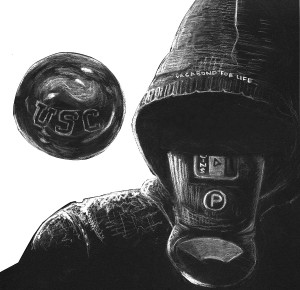Students must help combat homelessness
In a new initiative, the city of Pasadena recently repurposed parking meters to collect change for the homeless, launching the conversation about implications of anti-poverty initiatives closer to home. The 14 parking meters, which will fund programs that support the homeless, is intended to reduce panhandling and the direct donations from citizens to the homeless.
“This is a clear alternative [to panhandling] where people contributing know that all the money will go to effective services,” Pasadena Housing Director Bill Huang told the Los Angeles Times.
Though passive panhandling raises its own concerns — namely, whether the money will be used for food or drugs — our mistrust of this direct donation implies something more startling about the general population, especially here at USC: for many of us, homelessness is an issue often out of sight and out of mind because it’s simply uncomfortable to face head-on.
There’s something about interactions with the homeless that is deeply confrontational. The unnerving interruption of daily routine with the sight of those in disrepair, perhaps with a sign and a cup for spare change that tugs at the heart, is a jarring reminder of a harsh reality. Any response, be it giving a donation or ignoring panhandlers, evokes the same heartbreaking emotion. It places the responsibility on the individual, overwhelmed by the glaring evidence of greater socioeconomic issues at large in the community.
At USC, the disparity is even more conspicuous. According to Richard Parks, the executive director of the USC Sol Price Center for Social Innovation, in L.A. County, 27 percent of citizens live under the poverty line — the highest rate in California. Contrast that with USC students, many of whom pay up to $65,000 per year in tuition and room and board fees to attend the university. Though there is plenty of income diversity among USC students, it’s hard to miss the flagrant difference between USC and the community, especially since many poverty-stricken neighborhoods are just blocks from campus.
It makes sense then that an anti-poverty initiative would work to help the homeless while reducing the fundamental discomfort initiated by panhandlers. But by donating to homeless organizations instead of to the homeless directly, we indicate that we trust organizations to deal with homelessness rather than the homeless themselves. Such an assumption is dangerous — for one, it implies that the homeless are unable to take care of themselves. Such a mindset makes homeless seem synonymous to helpless, and reduces the number of people who might seek resources for their financial situation because of personal pride. Second, though we might like to say that pandhandlers’ questionable motives keep us from giving more to them, nonprofit organizations are also not always transparent.
Reducing panhandlers also conceals the issue of homelessness in our community; these parking meters can be used as an excuse to push the homeless out of well-populated areas. And with them out of sight, we cannot truly expect to attack the full range of social causes that contribute to homelessness. Ranging from mental illness to violence or abuse, the homeless have faced and continue to face unique experiences that lead to their situation. And instead of focusing solely on relief, we need to also take a macroscopic and microscopic look into the web of issues that cause homelessness.
Lilly Taing, a student leader of A Community Place, a USC student organization that packs lunches for the homeless, shared her thoughts on reaching out to combat those root problems. “Growing up, I was uncomfortable with homelessness because I thought these people didn’t work hard and had bad habits, and that’s why they were on the streets,” Taing said. “But working with these people and talking to them shows you that there’s more than just placing all the blame on these individuals. I encourage others who are interested in learning more about homelessness, or if they want to get out of their comfort zone, to learn more about these issues.”
It’s okay to be uncomfortable with homelessness. In fact, it’s important that we are. Sure, a city without panhandling is a pretty one, but if homelessness is prevalent, the discomfort that accompanies panhandling is crucial because it is a constant reminder to us that there is still work to be done. It stresses our inherent sense of obligation as citizens to do our part in bettering our community. And especially on a campus like USC, we need the reminder.
We don’t need to empty our wallets for every panhandler or donate to every homeless program. But we also don’t need to hide from homelessness or shrink in fear and ignorance. We can do our own research, form our own opinions on the issue and then get involved in our own ways — whether it be volunteering, supporting a certain initiative or just listening to the stories of the homeless.


